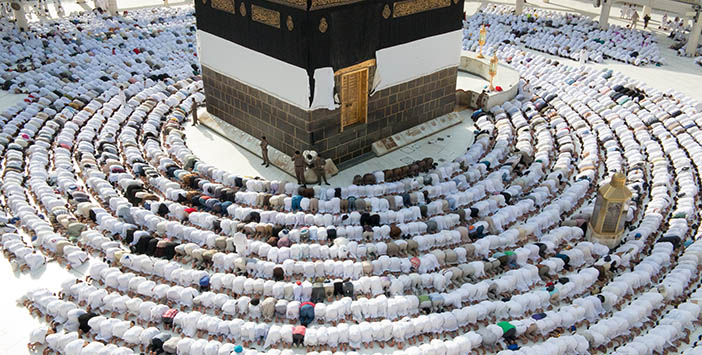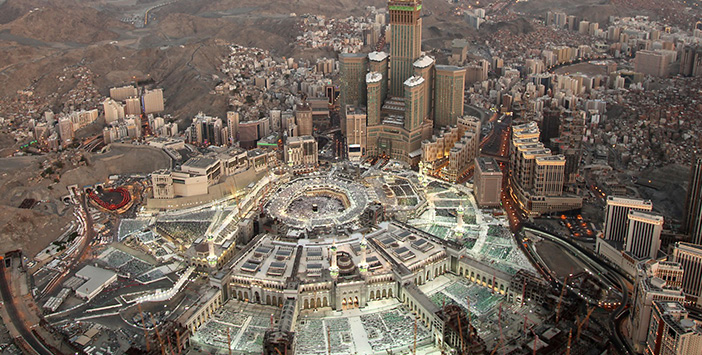What is the wisdom behind the choice of the arabian peninsula as the cradle of Islam? What is the importance and place of Arabia in Islam? Arabia: The cradle of Islam…
In order to better appreciate the choice of Arabia as the birthplace of Islam we need to know the nature, traditions and characteristics of Arabs as well as the geographical and social conditions of their homeland.
THE TWO SUPERPOWERS OF THE TİME WERE BOTH NEİGHBORS TO ARAB LANDS
The two superpowers of the time, the Byzantines and the Persians, were both neighbors to Arab lands. The Byzantines had many vassals and had problems with their subjects in religious issues. Their rulers corrupted Christianity by changing it according to their whims. In their Church councils, they proclaimed some scriptures as holy and others as heretical, manipulating the rules of Christian faith as they wished. They used excommunication for political reasons, and it was not uncommon for the new ruler to excommunicate the previous one. The heavy taxes enforced upon people and the bribery rampant among administration corrupted the base of society.
Persia was also in the grip of moral and political chaos. Allowing one to marry with one’s mother and daughter, the Zoroastrian religion was effectively wreaking havoc on human dignity. The Mazdean claim was that just as air, water and fire belonged to all, human beings exercised a similar right over women whom they could commonly use without any discrimination, just like the rest of their properties.
Greek civilization was in the vicious circle of endless philosophical disputes and superstitions, whereas Indian civilization remained in a primitive phase, both morally and socially.
Arabs, on the other hand, were living in close-knit societies, and surrounded by vast deserts, were remote from the threat of military and cultural invasions. They had never been colonized; hence they were like raw material uncorrupted by any foreign culture. Their natures were not polluted. Virtues like honor, keeping one’s word, generosity, locality, bravery and patience, among others, were still very much alive, except that they would either be shown in excess or in the bare minimum, and not in the perfected balance that befits human nature. Without a guide to show them the true way, they were living in the darkness of ignorance.

Their ignorance and slavery to their egos had veiled their good characteristics hidden underneath their human nature. Fearing they might be forced to prostitution by the enemy if captured as slaves in battles, the pagan Arabs would kill their daughters by burying them alive, much to the heartfelt dismay of their mothers; or they would squander their most basic needs just to protect their reputations of generosity. Their bravery and fearlessness would incite them to engage in ceaseless battles. The aftermath was always great bloodshed. The advent of Islam and the emergence of the Noble Prophet -upon him blessings and peace-, turned this tide upon its heels, steering all the wrong manifestations of their moral values to a positive direction, eliminating the negative outcomes of the good qualities they had deep inside.
THE CRADLE OF THE LAST PROPHET
Another reason as to why Arabia was chosen as the cradle of the last Prophet was to dispel any doubt that would have arisen regarding the authenticity of the Prophethood of the Messenger of Allah -upon him blessings and peace-. Since the Arabs were an illiterate people, they were left unaffected from the cultures and philosophies of surrounding nations. Had the Prophet -upon him blessings and peace- been a literate man conversant with the culture and knowledge of neighboring civilizations, as well as the content of their sacred scriptures, doubt would have arisen that the Prophet had conjured up his prophecy through learning from others. Similarly, with an ingrained resistance based on the long histories of their civilizations, the Persians or Byzantines would have perhaps found it difficult to accept Islam had the religion appeared in either of these environments. In addition, it could have led other people to think that Islam was the product of these environments and not a Revelation of the Almighty. To prevent such doubts Islam was therefore sent to an illiterate society through an unlettered Prophet -upon him blessings and peace-, leaving no room to validate the claim that Islam was a product of a literate Prophet and his cultured people.
THE ADVANTAGE OF THE CENTRAL PLACE
Arabia also had the advantage of occupying a central place in the world map between Europe, Asia and Africa, facilitating the spread and accessibility of Islam.[1] The Holy Quran describes Mecca as a place unfit for agriculture,[2] necessitating the locals to travel in order to get by. Agricultural societies are normally very much attached to their soil and not fond of travelling long journeys. Similarly, craftsmen are attached to their workshops and therefore are not fond of traveling either. As tradesmen, the Meccans were accustomed to travel long distances which proved to be a blessing for the spread of Islam in the long run. The advantage they had in being able to go to distant countries and their experience in interacting with many different people could count as another reason as to why Islam was sent to the people of Mecca.
The Divine Will graced the Arabic language as the vehicle of transmission due to the excellent qualities inherent within that language itself. Compared to other languages, the Arabic language enjoys superior qualities in terms of its harmony and syntax, in producing derivations, conjugations and so on. Arabic has the power of transmitting the most difficult meanings in the curtest words, without losing any nuance. Its richness allows the language to transmit the most abstract ideas in the most admirably eloquent way. The Arabic language had completed its development early, making it the only language at the time capable of transmitting the Divine Will in the most perfect way.
The Arabian peninsula is also a blessed environment. The great-grandfather of Prophet Muhammad -upon him blessings and peace- lived in this area and built the Kaabah, the foundations of which had been there as old as the history of mankind. With an awareness of this historical fact, Meccans considered themselves as heirs of the spiritual inheritance of Ibrahim and Ismail –upon them be peace-. This is another factor that helped the acceptance and understanding of Islam.
Though one can certainly enumerate many more causes for the choice of this land for the revelation of Islam, there ultimately lies a wisdom behind it which we cannot know, and which is known only to Allah, glory unto Him. We therefore feel compelled to conclude this discussion with the words “اَللهُ أَعْلَمُ بِمُرَادِهِ : Allah knows best what He wills.
Source: Osman Nuri Topbaş, The Prophet Muhammed Mustafa the Elect, Erkam Publications
[1] See Muhammad Ilyas Abdulghanî, Târihu Makka, p. 12-13.
[2] See Ibrahim, 37.



